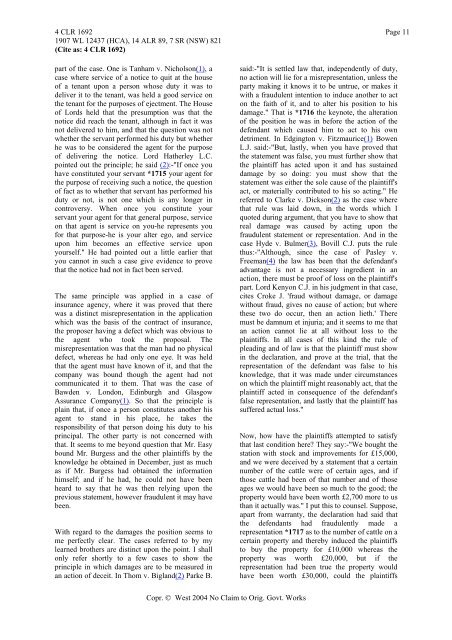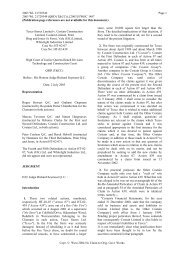Holmes v Jones - Thomson Reuters
Holmes v Jones - Thomson Reuters
Holmes v Jones - Thomson Reuters
- No tags were found...
You also want an ePaper? Increase the reach of your titles
YUMPU automatically turns print PDFs into web optimized ePapers that Google loves.
4 CLR 1692 Page 111907 WL 12437 (HCA), 14 ALR 89, 7 SR (NSW) 821(Cite as: 4 CLR 1692)part of the case. One is Tanham v. Nicholson(1), acase where service of a notice to quit at the houseof a tenant upon a person whose duty it was todeliver it to the tenant, was held a good service onthe tenant for the purposes of ejectment. The Houseof Lords held that the presumption was that thenotice did reach the tenant, although in fact it wasnot delivered to him, and that the question was notwhether the servant performed his duty but whetherhe was to be considered the agent for the purposeof delivering the notice. Lord Hatherley L.C.pointed out the principle; he said (2):-"If once youhave constituted your servant *1715 your agent forthe purpose of receiving such a notice, the questionof fact as to whether that servant has performed hisduty or not, is not one which is any longer incontroversy. When once you constitute yourservant your agent for that general purpose, serviceon that agent is service on you-he represents youfor that purpose-he is your alter ego, and serviceupon him becomes an effective service uponyourself." He had pointed out a little earlier thatyou cannot in such a case give evidence to provethat the notice had not in fact been served.The same principle was applied in a case ofinsurance agency, where it was proved that therewas a distinct misrepresentation in the applicationwhich was the basis of the contract of insurance,the proposer having a defect which was obvious tothe agent who took the proposal. Themisrepresentation was that the man had no physicaldefect, whereas he had only one eye. It was heldthat the agent must have known of it, and that thecompany was bound though the agent had notcommunicated it to them. That was the case ofBawden v. London, Edinburgh and GlasgowAssurance Company(1). So that the principle isplain that, if once a person constitutes another hisagent to stand in his place, he takes theresponsibility of that person doing his duty to hisprincipal. The other party is not concerned withthat. It seems to me beyond question that Mr. Easybound Mr. Burgess and the other plaintiffs by theknowledge he obtained in December, just as muchas if Mr. Burgess had obtained the informationhimself; and if he had, he could not have beenheard to say that he was then relying upon theprevious statement, however fraudulent it may havebeen.With regard to the damages the position seems tome perfectly clear. The cases referred to by mylearned brothers are distinct upon the point. I shallonly refer shortly to a few cases to show theprinciple in which damages are to be measured inan action of deceit. In Thom v. Bigland(2) Parke B.said:-"It is settled law that, independently of duty,no action will lie for a misrepresentation, unless theparty making it knows it to be untrue, or makes itwith a fraudulent intention to induce another to acton the faith of it, and to alter his position to hisdamage." That is *1716 the keynote, the alterationof the position he was in before the action of thedefendant which caused him to act to his owndetriment. In Edgington v. Fitzmaurice(1) BowenL.J. said:-"But, lastly, when you have proved thatthe statement was false, you must further show thatthe plaintiff has acted upon it and has sustaineddamage by so doing: you must show that thestatement was either the sole cause of the plaintiff'sact, or materially contributed to his so acting." Hereferred to Clarke v. Dickson(2) as the case wherethat rule was laid down, in the words which Iquoted during argument, that you have to show thatreal damage was caused by acting upon thefraudulent statement or representation. And in thecase Hyde v. Bulmer(3), Bovill C.J. puts the rulethus:-"Although, since the case of Pasley v.Freeman(4) the law has been that the defendant'sadvantage is not a necessary ingredient in anaction, there must be proof of loss on the plaintiff'spart. Lord Kenyon C.J. in his judgment in that case,cites Croke J. 'fraud without damage, or damagewithout fraud, gives no cause of action; but wherethese two do occur, then an action lieth.' Theremust be damnum et injuria; and it seems to me thatan action cannot lie at all without loss to theplaintiffs. In all cases of this kind the rule ofpleading and of law is that the plaintiff must showin the declaration, and prove at the trial, that therepresentation of the defendant was false to hisknowledge, that it was made under circumstanceson which the plaintiff might reasonably act, that theplaintiff acted in consequence of the defendant'sfalse representation, and lastly that the plaintiff hassuffered actual loss."Now, how have the plaintiffs attempted to satisfythat last condition here? They say:-"We bought thestation with stock and improvements for £15,000,and we were deceived by a statement that a certainnumber of the cattle were of certain ages, and ifthose cattle had been of that number and of thoseages we would have been so much to the good; theproperty would have been worth £2,700 more to usthan it actually was." I put this to counsel. Suppose,apart from warranty, the declaration had said thatthe defendants had fraudulently made arepresentation *1717 as to the number of cattle on acertain property and thereby induced the plaintiffsto buy the property for £10,000 whereas theproperty was worth £20,000, but if therepresentation had been true the property wouldhave been worth £30,000, could the plaintiffsCopr. © West 2004 No Claim to Orig. Govt. Works
















